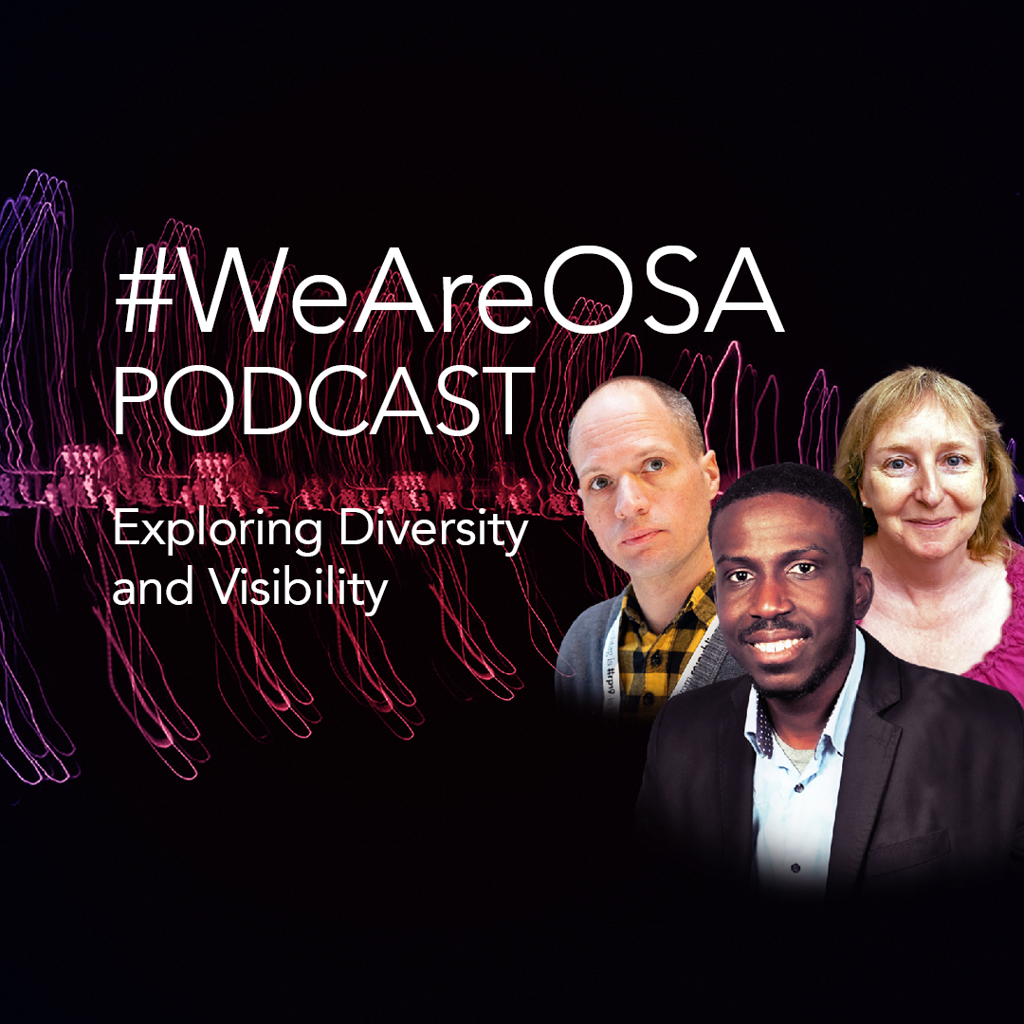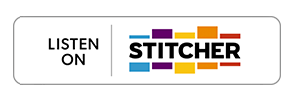Optica Blog
Exploring Diversity and Visibility
Marcia Lesky, Sr. Director Diversity, Inclusion & Volunteer Cultivation, OSA
We Are OSA is a new series of podcasts, blogs and articles featuring inspirational stories from scientists & engineers.
Transcript
Timothy Imogore: There's going to come a time whereby you realize that you're in a new country, thousands of kilometres away from your home country. Yeah, it happened to me, and I can remember, almost you know, shedding tears. There was, uh, one very huge mountain I had to cross.
Klaus Jaeger: And when I started studying physics, you know, I had the feeling, you know, that being gay was not, not an issue, but only retrospective I realized that I didn't have any role models.
Sile Nic Chormaic: You start noticing may be some exclusions, and the only thing you can see that you have in common is that you are the female faculty.
Megan: Welcome to the, We Are OSA podcast, a new series featuring inspirational stories and perspectives from scientists and engineers, improving the world.
In this episode, you'll hear from three distinct OSA members sharing their perspectives and experiences. They bring unique insights to our discussion shaped by the intersectionality of their gender, race, sexual orientation, and ethnicity, coupled with their passions for optics and photonics.
Klaus Jaeger: Hello, my name is Klaus Jaeger.
I'm a physicist, and I'm working at a research center in Berlin, Germany, where I mainly do optical solid simulations for solar cells.
Sile Nic Chormaic: So I'm Sile, Nic Chormaic, and I'm a professor at OIST Graduate University in Okinawa. OIST is the Okinawa Institute of Science and Technology.
Timothy: Okay, so my name is Timothy Imogore, and I am a PhD student at the Ultrafast Optics, uh, Research Group, uh, at the Institute of Applied Physics Group, Jena.
Megan: Timothy, Sile, and Klaus have some unique perspectives from their effort to find inclusion in new countries, as well as their scientific careers.
Klaus Jaeger: I'm originally from Austria, and I live now in Berlin. So I grew up in the mountains in Austria, studied in Switzerland, did a PhD in the Netherlands and ended up in Berlin, Germany, six years ago.
Sile Nic Chormaic: So I'm currently living on Okinawa. So Okinawa is a small, uh, subtropical Island. In fact, it's a chain of islands in the very far south of Japan. So we're very far from Tokyo and, uh, I'm originally from Ireland, so quite far from there at the moment.
Timothy: So I'm from Nigeria. I was born in the Northern part of Nigeria.
Megan: Each of them have benefited from different perspectives in their new environment, which welcome people from all backgrounds.
Timothy: For me, I've seen this as an advantage, you know, uh, when I've interacted with colleagues from different places, I have a colleague who is also from, from Italy, uh, whenever I actually discuss it, and it gives me a different perspective to something that I've been working on. For some time, when I discussed with my German colleagues, they give me a different perspective. They make me look at things, you know, really, really, really differently, you know, um, diversity is always an advantage when it comes to innovation.
Sile Nic Chormaic: We have a diverse student body. So I'm not sure how many countries they come from, but maybe sixty, but we have no dominant nationality. So most, most universities will have some dominant nationality, and we try to avoid having a dominant nationality,
Klaus Jaeger: Berlin, which many people consider the gay capital of the world, because there are many nightclubs, many people, at least before the pandemic, many people from all around the world came to Berlin to dance, to spend their nights there or completely moved there.
Megan: But Sile, Timothy and Klaus have each had times when they felt alone, isolated or excluded.
Timothy: People I had just met and ‘hi, how are you? How are you doing? My name is Timothy. I'm from Nigeria’. And I was doing this to kind of build some kind of, um, rapport with these people so that they can actually maybe seek for help when I need some kind of group study or something like this.
So, well, they responded very well with this sounded very enthusiastic, you know, about our meeting and, basically excited. Yeah. That was what excited me about our meeting. However, Uh, the next day, it's as if they have not met me before. So it's like a new thing. So I had to do this over and over and over and over again.
Klaus Jaeger: When it comes to private life, you know, almost everybody would talk about their partner or their husband or wife and their children. And then I, not being straight, always felt a little bit uncomfortable. Every time you meet a new person, you have to come out that person because every time still, you know, it's kind of the first people think that you're straight.
Sile Nic Chormaic: there have been several situations here, um, within the community in Japan, where I have felt the only woman out of 500 people wearing black suits. I have been in one situation in my first year here where I went to society, annual meetings, and the only other woman in the room was the local - I think it was Hiroshima I was in the local Hiroshima beauty queen - and she was giving awards to the men on the stage.
Megan: despite these moments of isolation, because of their differences, these OSA members see how differences can be embraced and how that will make the field of optics and photonics stronger and more welcoming.
Klaus Jaeger: So I think visibility is to me most important or a very important aspect, just to show how colorful and diverse science optics photonics are and how this colorfulness and the different profiles of people also can make the research more successful.
Timothy: I saw the enthusiasm on the part of the lecturers to go an extra mile after the lectures to actually answer questions from students who are coming from different backgrounds from China, for example, from India, from Nigeria, from Ghana.
Sile Nic Chormaic: There can be some really pleasant surprises, uh, coming out of that, you know, that you really see the ability of somebody they may not have had the opportunities in their home country um, but suddenly they can shine when given this opportunity.
Megan: The good news is recently, there's been a concerted effort made by OSA and the scientific community in general, an effort that addresses exclusions of the past and works towards inclusivity.
Klaus Jaeger: Uh, so when I started working in science, it still was very, for many years I still felt quite unsecure. I just had the feeling, you know, my, my, my gay identity would be something that's kind of apart from, from the professional identity and just not something that should be disclosed to openly. And so I was very happy when only a few years ago, suddenly these, these issues and topics were also addressed in the conference calls. And so I then suggested whether we could make some LGBTQ meetup at the conferences.
Timothy: One of the things that our school of photonics did, which is very impressive and I really appreciate them for, was that as soon as we came into Germany, the welcome, welcome of course, I came in on a scholarship with you with a very good scholarship. But apart from that, they also welcomed us with a lot of trainings to make us understand what we will face.
Megan: Sile, Timothy and Klaus have seen real positive change come out of these efforts to welcome people from different backgrounds. These are efforts that they're actively a part of.
Sile Nic Chormaic: I remember actually one time, one OSA event, and it was, I guess it was a fellow where they were honoring fellows, OSA fellows for that year. And it was probably within the last 10 years. And I remember getting pretty annoyed. That the word almost no women becoming OSA fellows. So I was like, well, okay, we clearly have a problem here because everyone becoming a fellow or at least everyone on the stage at this event was I was a guy, and I don't know how many people there were probably 20, 30 people and all of them were men.
And I, what I now make sure to do is that, uh, I nominate my own researchers or young researchers. I see, you know, young colleagues. I think it's improving. If I look at the number of people who are becoming fellows each year, certainly certainly with conferences in the last couple of years, there's a lot more effort to have a female representation. And again, it all comes down to visibility.
Klaus Jaeger: But we had done last year, an online LGBTQ meeting within the conference where I was a chair of one of the meetings. And this was very nice. I think it was something like more than 12 people just discussing one hour on these issues.
Timothy: I think the OSA is very, very inclusive, and it, for me, I think they do very well by using the the students, um, bodies in different cities and different universities and also by the global programs that they actually have in place.
Megan: But even though progress has been made, it's clear that there's still a ways to go.
Sile Nic Chormaic: I saw a photo last week of a group in Germany, and it was like, I don't know, there were 16 people in the photo, and they all looked so identical. It was like clones. And I was, I just found it amazing that there are still images like that around the world being visible. And, uh, yeah, so at least I don't think we have that problem as always everyone, you know, you look at our groups, our research groups, they are so diverse. Yeah. In every way to see a uniform group then looks so strange to me.
Timothy: Well, I believe yes, because growth is a continuum. Yeah. So anything doesn't grow is dead. So, um, there's always room for growth in terms of diversity. We should not actually forget.
Megan: These members have some ideas for what more OSA can do to promote diversity and inclusion within optics and photonics.
Sile Nic Chormaic: We have to look at exactly the demographic in which we're working. What does not prevail into this demographic? What should we work on? What is needed? What should we be accepting?
Klaus Jaeger: I think probably it really would have made things a bit more bit easier for me if there would have been more role models, you know, because I felt quite alone as a physics student. I think increasing visibility just can help this, this what might be another advice, you know, something that's that, that society could do.
And just maybe in one of the optics photonics news, or no, just seven-page on, on openly LGBTQ scientists. And here we are, gay people are not just some fancy hairdressers, but they're everywhere. Also, boring looking scientists can be gay, but I think it's a very good step also to include trans or non-binary people more naturally. So maybe this could be something the society could consider doing just, you know, offer people or to, to add name tags to the pronouns.
Timothy: I think there's something that needs to be done. I feel that they can actually improve more on when it comes to financial supports to students in developing countries. For example, um, students in Cameroon, students in Nigeria, um, students in, in Ghana, Um, if there's a way to connect to the put-in programs that can actually make the students, um, have some kind of international experience, especially when they're dealing with something as optics related, or they have some kind of interest in optics,
Megan: each of these members is highly committed to strengthening their field. They believe that in order to solve complex global problems, we need the best thinking from diverse, talented scientists and engineers. This comes when people feel visible and comfortable to be their true and authentic selves.
Timothy: I think that also happens sometimes is that these people sort of turn back to their home countries. So this is something that I look forward to in the future. I'm very, very interested. I'm very keen on doing these, of transferring my knowledge back to the society, to whatever way it means possible.
Klaus: We are nowhere in Berlin, also tried to, to increase the visibility of LGBTQ scientists and together with some friends, we found it's, um, a local network for LGBTQ people within STEM with regular meetups. And I think this is a very important process.
Sile Nic Chormaic: You know, don't let what you see going on around you influence how you're going to be yourself. Um, and don't let it impact you to the point where you quit. I would say to young women, you know, just do it. Yeah. If you want to do it, do it. If you don't want to do it, don't do it. Don't feel pressurized to do it if you don't want to do so. I think, um, yeah, perseverance, maybe perseverance might be the thing, you know, don't give up. Yeah.
Klaus Jaeger: Seeing that one of the big science societies like OSA is actively supporting diversity, of course, made me more self-confident push also within my German research environment.
Megan: As the world works towards a more inclusive future, Sile, Klaus and Timothy have some advice for anyone who might be feeling like they're on the outside, looking in,
Timothy: study hard, do your homework properly. You'll have the opportunity, the opportunity to always be there to actually go outside of country um, to study, um, the opportunity is also going to be there to come back to the country and give back what you've gotten.
I would advise everyone who is thinking about studying optics on feeling that maybe it's not going to be too easy, that you can, you can - I did it, and you can do it.
Klaus Jaeger: So this is at least, you know, our societies are so that, you know, trust us being straight is the norm that, you know, you always have to have this extra step of, of explanation. And therefore, just by, by showing, no, we are anyway. Science is all other features, more colorful. I just guess that it may can make life easier for young people coming in.
Sile Nic Chormaic: Don't let what you see going on around you influence how you're going to be yourself.
Klaus Jaeger: I don't know, but if I can, you know, if people see me as, okay, it's just some physics doing solar energy research who is openly gay, if this helps somebody, I am very happy about it.
Megan: Thanks for listening to the We Are OSA podcast. We hope this episode will encourage you to reflect on your own surroundings and how you can embrace diversity and equity in order to make your lab, your university or company more welcoming, special. Thanks to the voices on this episode for sharing their stories with us. Visit osa.org forward slash We Are OSA over the next few months to hear other episodes and read insightful articles.

We Are OSA podcast, "Exploring Diversity and Visibility" featuring, from left to right: Klaus Jaeger, Timothy Imogore and Sile Nic Chormaic
This #WeAreOSA podcast explores diversity, visibility, and intersectionality through the unique perspectives of three OSA members – Timothy Imogore, Klaus Jaeger, and Sile Nic Chormaic. They seek to reinforce the importance of inclusion as part of their career journey and their optics community.
Sile, Timothy, and Klaus’ stories come at a critical moment in time, amid OSA and the scientific community making concerted efforts to address exclusion and work towards inclusivity. Although each has each had times when they felt alone, isolated, or excluded, these OSA members can envision how differences can be highlighted and embraced and how that will make the field of optics and photonics stronger and more welcoming.
Featured in this podcast
Dr. Klaus Jäger – is Senior Scientist and Deputy Department Head at Helmholtz-Zentrum Berlin für Materialien und Energie and works on optical simulations for solar cells. Besides his research activities, he is also engaged in science communications, mainly to discuss the climate crisis and solar energy potential. He is a core team member of the network LGBTQ+ STEM Berlin.
Professor Sile Nic Chormaic – studies the interaction of light in confined geometries with matter, including optical nanofibre mediated interactions with cold atoms, optical trapping using tweezers and plasmonic surfaces, and whispering gallery resonators. Sile is a team member of Homeward Bound – a global leadership initiative aimed at increasing the influence of women in decision-making that shapes our planet.
Timothy Imogore – is a Nigerian doctoral student in Ultrafast Optics at the Institute of Applied Physics Jena, Germany. His research focuses on developing novel fiber Bragg grating design and inscription processes using femtosecond laser pulses for advanced dispersion control.




